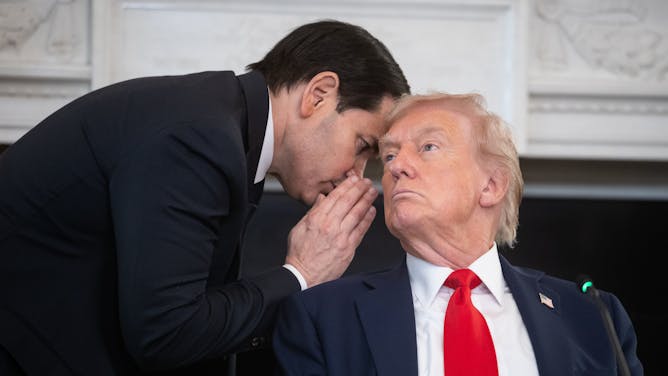|
US President Donald Trump came to the Middle East to witness the first phase of the Gaza peace deal in person: the release of the remaining Israeli hostages held by Hamas, and Palestinian prisoners held by Israel.
Should the peace hold, this will be the crowning foreign policy moment of his second presidential term, with some Israelis hailing him as Cyrus the Great reborn. (And here’s what that means, in case your biblical references are a little rusty.)
So, how did he do it? US politics analyst Lester Munson says Trump is taking an unconventional, high-energy and fast-moving approach to foreign policy that has netted some immediate successes.
His use of deal-making envoys such as Steve Witkoff and Trump’s son-in-law Jared Kushner, coupled with his own personal diplomacy, has been welcomed in the Middle East where conventional diplomacy is fraught with historical baggage.
But is this style sustainable? Munson says the true test of Trump’s foreign policy may not even be Gaza – he has other deals he’s energetically trying to secure.
|

|
Justin Bergman
International Affairs Editor
|
|

Lester Munson, University of Sydney
Trump’s foreign policy approach is fast-paced and intensely personal. The true test of its success won’t be Gaza, but geostrategic conflicts with China and Russia.
|

Peter Edwell, Macquarie University
One wonders what Cyrus the Great, founder of the Achaemenid Persian empire, would think of the comparison.
|

Michelle Grattan, University of Canberra
Jim Chalmers has watered down from Labor’s changes to superannuation, and fully dumped the plan to tax unrealised capital gains.
|

Marina Yue Zhang, University of Technology Sydney
We’ve entered a period where control of a few key resources and trade routes gives countries enormous leverage.
|

John Quiggin, The University of Queensland
It’s one thing to abandon the dogmas of neoliberalism. It’s quite another to develop a coherent alternative.
|

Kiriloi M. Ingram, The University of Queensland
The issue of returning Australian citizens connected to Islamic State has become a vexed issue. There are better ways to handle it.
|

Rick Sarre, University of South Australia
A legal expert reviews Duncan McNab’s Recipe for Murder and Greg Haddrick’s The Mushroom Murders – both published on the same day.
|

Sarah Perkins-Kirkpatrick, Australian National University; Andrew King, The University of Melbourne; Nicola Maher, Australian National University; Wesley Morgan, UNSW Sydney
The results challenge claims that the climate risks posed by an individual fossil fuel project are negligible or cannot be quantified.
|
Politics + Society
|
-
Michelle Grattan, University of Canberra
Sussan Ley has reshuffled her team again after Liberal Andrew Haste resigned as Shadow Minister of Home Affairs over immigration concerns.
-
Dan van den Hoek, University of the Sunshine Coast; Jackson Fyfe, Deakin University
Have you ever thought of your body as a portable gym? It can be, whether it’s squats in the park or push-ups at home.
|
|
Health + Medicine
|
-
Liz Sturgiss, Bond University; Kimberley Norman, Monash University
Weight doesn’t tell us the whole story about a person’s risk for poor health.
-
Dileep Sharma, University of Newcastle
Here are some tell-tale signs of gingivitis, and what to do about this common type of gum disease.
|
|
Environment + Energy
|
-
Valentina Dinica, Te Herenga Waka — Victoria University of Wellington
Changes to New Zealand’s conservation laws could delist up to 60% of protected areas. There are better ways to balance ecological values with economic gains.
-
Matt McDonald, The University of Queensland
Trump might have pulled the pin on US climate action but the world could move on without him.
|
|
Science + Technology
|
-
Johanna Lim, University of Sydney
Australia could be a global champion for sustainable data centre growth.
-
Tara Djokic, Australian Museum; UNSW Sydney
Highly detailed fossils are typically found in shale or other fine-grained sedimentary rocks. These ones? They’re made of iron.
|
|
Arts + Culture
|
-
Kirk Dodd, University of Sydney
The classic 1955 D’Arcy Niland novel has been adapted by Kate Mulvany and directed by Jessica Arthur for the Sydney Theatre Company.
|
|
Books + Ideas
|
-
Joanne Anderton, The University of Queensland
Andrew Roff’s debut novel, Here Are My Demands, looks forward to an imagined future – but seems more concerned with now.
|
|
|
|
|
Our coverage
"Yesterday’s newsletter mentions that Palestinians in Gaza are now 'returning home'. I was wondering if you think it would have been prudent to be more clear about what home is, given the vast majority of buildings in Gaza have been destroyed?
The coverage on October 7 was equally vacuous: 'Who would’ve thought that a war in a faraway land would have such an impact in Australia?' Probably anyone who understands the intersection of capitalism, colonisation, and western supremacy.
These dangerous omissions contribute to the great shame of western media in perpetuating genocide. I do wonder, what will accountability look like, at all levels, when the dust settles?"
Lachlan Greig
We'd love to hear from you. You can email us with your thoughts on our stories and each day we'll publish an edited selection.
|
| |
|
|
|
The Conversation AU/NZ
Melbourne Victoria, Australia
•
Full Time
|

|
|
|
|
| |
| |

|
| |
| |
| |
|
|